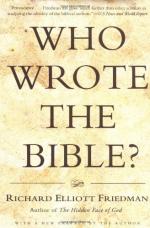
|
| Name: _________________________ | Period: ___________________ |
This test consists of 5 multiple choice questions, 5 short answer questions, and 10 short essay questions.
Multiple Choice Questions
1. What does Jeremiah mention in his writing that none of the other prophets mention?
(a) the breaking of the tables of stone.
(b) Aaron and the golden calf.
(c) the bronze snake of Moses.
(d) the mountain of transfiguration.
2. How does Jeremiah see the Aaronid priests like Author P?
(a) as usurpers of God's command for Levite priests.
(b) as the true inheritors of the priesthood.
(c) as liberals bent on changing the law.
(d) as a priestly class that casts Moses in a bad light.
3. Who writes his book in much the same way that Deuteronomy had been written?
(a) Jeremiah.
(b) Josiah.
(c) Samuel.
(d) David.
4. Who conquered the Babylonians in 538 B.C.?
(a) the Persians.
(b) the Romans.
(c) the Greeks.
(d) the Egyptians.
5. What does Friedman suggest gives a clue as to the identity of the writer D?
(a) the changes in the wording of the law.
(b) the language used in writing Deuteronomy.
(c) the contents of the law code presented in Deuteronomy.
(d) the length of the book of Deuteronomy.
Short Answer Questions
1. To whom does Deuteronomy give jurisdiction in legal matters?
2. What does Friedman speculate held the exiled Jews together?
3. How does Friedman remind the reader that one can only really understand the exile?
4. Who had been a Levite priest of Anathoth and had never done sacrifices?
5. According to Friedman's theory, when does that place Author P in time?
Short Essay Questions
1. How does the importance of sacrificing becomes apparent?
2. How does Friedman identify as writer R, the redactor who stitched together all the various versions into one Torah?
3. How did Cyrus the Great figure into the history of the Jewish exile?
4. What is problematic about the mistake in locating writer P in history?
5. Where does Friedman place the Tabernacle at the time of the First Temple?
6. At what point does the original draft of Deuteronomy stop making sense?
7. During what historical time frame does Friedman place the writer P?
8. How does writer P interject his ideas about miracles and the authority of the Aaronid priests?
9. Describe the great irony of the P version of the Torah.
10. How was responsibility for the eventual exile of the people defined in the later text?
|
This section contains 799 words (approx. 3 pages at 300 words per page) |

|




